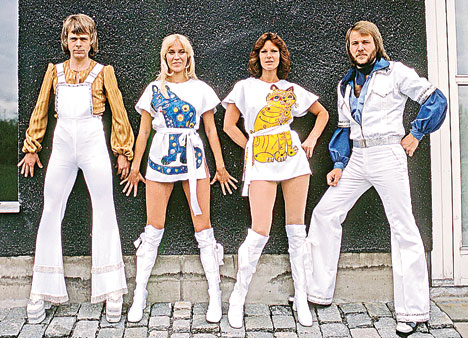
Hollywood producers Judy Craymer and Gary Goetzman will once again dig into the Abba nostalgia trove to collect a few hundred million at the box office with Mamma Mia! Here We Go Again. And Abba themselves — Agnetha Faltskog, Bjorn Ulvaeus, Benny Andersson and Anni-Frid Lyngstad — are all set to release two new singles after more than 35 years in December, one of them being the aptly titled I Still Have Faith in You. Irrespective of the fact that the songs would either be pop gold or reach the heights of pop mediocrity, the lessons Abba learnt and taught remain as relevant in Brexit era as it was when the UK joined the European Union in 1973. Why? Read on...

1 Early Abba was bland. Ring Ring and People Need Love are almost forgettable. But post-Waterloo (1974) — the winning entry for Sweden in the 1974 Eurovision Song Contest (inset) — there was a sense of grandeur and a lot more snap, like being on a merry-go-round. With that one song, Abba no longer belonged to Sweden alone. Europe — yes, the Europe into which the United Kingdom had slipped into as member of the European Union a year earlier — became Abba’s oyster. As members of the Union became more European, Abba’s music took inspiration from across the continent to deliver pop that was grander and not just jingly numbers.

2 The music of this quartet remains a template for musicians from non-English-speaking countries. What Abba wrote was a) simple b) the idioms were known c) words are pronounced phonetically. This is a formula that was followed by other Swedish successes on the global scene, Roxette and Ace of Base.
In fact, Ace of Base (the third most successful Swedish group after Abba and Roxette; picture above) band member Ulf Ekberg explained this idea well in an interview with The National in 2011: “For the Americans, it’s the lyrics first, production second and melody last. I am not saying the lyrics are not important, but for us Swedes, for whom English is our second language, we just try to make it understood by a world audience. Because of this focus on lyrics, some of the American songs are complicated and can sometimes be not much fun. While for us, we always try to reach to as many people as we can, so we have feel-good melodies and simple lyrics so everyone can have fun.”
In way of literary interest, there is little Abba has delivered but when it comes to being influential, they remain inescapable. The world is still having fun and singing along to Sweden’s Fab Four. “I think being Swedes we have a very down-to-earth way of looking at ourselves and what we do. We’ve never had any, what do you call it... hubris?” Frida Lyngstad has told The Guardian.

3 Visual richness and trendy are terms that define Abba. Most of their songs evoke images — Slipping Through My Fingers is about a mother watching her daughter grow up and The Day Before You Came describes the mundane things a girl does (like watching Dallas on TV and going for a walk) before the person she loves appears, changing her life. And most of their songs were and are trendy — Voulez Vous still fits snugly into a party playlist and Dancing Queen still sounds anthemic. This entire business of being trendy is entrenched in the Swedish soul. Consider this: H&M and Ikea are the two names that come to mind when talking about trendy and affordability. Similarly, this Nordic country has always been receptive to music from all over the world: Beatles (top left) turned up in Sweden in 1963 to play five gigs but that was enough to stimulate interest in a new sound. This knack for receptivity has been passed down through generations.

4 Tax evasion was as much a reality in Era Abba as it in 2018: Nothing has changed! We blame Abba for dumping on us glittering hotpants, platform heels and white silk kimono (above) but the group can only blame the Swedish tax code. According to Abba: The Official Photo Book, tax benefit was given for sporting outrageous outfits. Yes, Swedish tax laws back then allowed the cost of their costumes to be deducted against tax only if they were so outrageous that it couldn’t be worn for everyday use. Well, Money, Money, Money!

5 In their divorce lies one of life’s facts — high-profile marriages in music business rarely last. The Abba stock was going through the roof when their final album (if we don’t consider what may come from them in the future) appeared — The Visitors (1981). It’s a divorce album that was as tumultuous as Bob Dylan’s Blood on the Tracks (1975), Marvin Gaye’s Here, My Dear (1978), Phil Collins’s Face Value (1981) and Coldplay’s Ghost Stories (2014). The Visitors was a noir masterpiece containing When All Is Said and Done, Like an Angel Passing Through My Room, One Of Us and Head over Heels. In the songs, one can feel the tension, which Bjorn Ulvaeus and Agnetha Faltskog (divorced July 1980), and Benny Andersson and Anni-Frid Lyngstad (divorced 1981) felt while recording them, which Bjorn Ulvaeus has expressed well in an interview: “The music of Abba is not that happy. It might sound happy, in some strange way, but deep within it’s not happy music. It has that Nordic melancholic feeling to it. What fools you is the girls’ voices. You know, I do think that is one of the secrets about Abba. Even when we were really quite sad, we always sounded jubilant.”
Abba will release two new songs this year. Suggest lyrics for one song in 50 words only!
Write in to t2@abp.in











